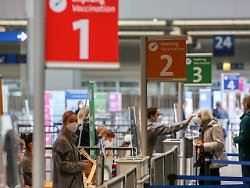Monday, February 01, 2021
Vaccination peak can solve little
Spahn no longer wants to be the bogeyman
From Frauke Niemeyer
At the national vaccination summit today, it should be about how many doses will be available for Germany in the next few months. Spahn wants to distribute the responsibility on several shoulders, the SPD wants to make sure that Spahn is still the culprit.
To claim that the vaccination campaign in Germany is not going well would be flattered. First the manufacturer Biontech / Pfizer is suspending its deliveries for a week due to the renovation of a plant in Belgium. Then Astrazeneca said that it could not even deliver half of the cans ordered by the EU for the first quarter of 2021: instead of 80 only 31 million. North Rhine-Westphalia, as the largest federal state, calls on its 1.2 million seniors over 80 to get a vaccination appointment from the same day at the same time, and is then very astonished that the servers are dead and people are outraged by the poor organization underground .
The vaccination summit should now fix it – but how? The unfavorable EU treaties that were concluded too late are in place, and today's Bund-Länder Round does nothing to change that. But you might be able to take advantage of the video switch for other purposes. At least that's what the SPD seems to think. Berlin's Governing Mayor Michael Müller sent Angela Merkel a letter on Friday. In it the "dear Federal Chancellor" is asked to provide "reliable and binding information on vaccine deliveries". The ability to plan "in the sense of a delivery corridor with minimum and maximum quantities" is of great importance.
At the same time, in an interview with the "Süddeutsche Zeitung", SPD chancellor candidate Olaf Scholz calls for clear calculations "in which time we can vaccinate how many citizens with us". It is not enough for planning to want to include the general practitioners in addition to the vaccination centers at some point. "That seems to me to be too much of a concept off my sleeve. The vaccination summit should commission specific calculations." It is also important for Scholz to establish that he was not involved in the negotiations with the pharmaceutical companies, which were of course led by the EU Commission. From the point of view of the SPD, Health Minister Jens Spahn should continue to be the focus of the complaints as the person responsible here. The Social Democrats are doing their best to ignore the fact that, as part of the federal government, they share responsibility for the vaccination debacle – Vice Chancellor Scholz would be the first to be named.
Officially, the SPD is not concerned with election campaigns, but with predictability. That sounds wonderful, but in the current situation it is an unreal goal. Just two days ago, the Moderna Group announced a reduction in its delivery quantities (minus 43,200). It has been known since 6 a.m. this morning that Biontech, on the other hand, intends to deliver 75 million more cans to the European Union in the second quarter, i.e. from April. Astrazeneca has also reported back and is adding nine million doses for the EU – instead of 31, 40 million vaccinations would be possible.
More capers are to be expected
In a situation in which there are only three vaccines worldwide that have been tested and approved for the EU, these three reports will most certainly not be the last capers to be hit by the manufacturers. In this case, planning can only be: to be prepared for the best case scenario. Better to let a perfectly equipped vaccination center run at half speed for a few weeks than logistically not keep up when the next big batch of vaccination doses reaches Germany.
Scholz emphasized in the run-up to the vaccination summit that he had insisted that the pharmaceutical companies also take part. What this should lead to in terms of content, apart from increasing the number of participants in the switch towards 30 – representatives of the EU Commission are also there – remains questionable. The manufacturers' contractual partners would be the Commission or the Federal Government. And it would also be the latter who, together with the corporations, would have to explore the form in which Germany could contribute with additional funding to increase vaccine production as quickly as possible.
After all, Jens Spahn could benefit from the mega switch. The more country leaders and cabinet members have a say today, the less they can complain in the next few weeks about recent changes in delivery quantities and times, pointing out that they were not involved in the talks with the vaccine manufacturers. See Olaf Scholz.
Otherwise one can hope from the vaccination summit that the federal states will increasingly move from their easing competition to a vaccination competition. It would actually be expected to have an exclusively positive effect for those willing to vaccinate if every country chief and country chief were to pursue the goal of getting very quickly up the ranking that measures the proportion of vaccinated people in the population. Because regardless of how often the delivery quantities of the three currently usable vaccines still change – the portion that is made available to the federal states always remains the same.
. (tagsToTranslate) Politics (t) Corona vaccine (t) Jens Spahn (t) Olaf Scholz (t) Corona crisis (t) Vaccination
